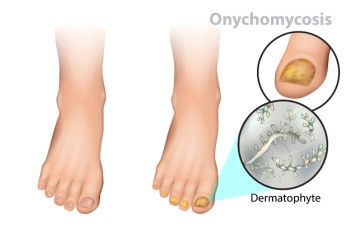

Toenail fungus, or onychomycosis, is a common infection that affects the toenails, caused by various types of fungi. It often starts as a white or yellow spot under the tip of the toenail and can spread deeper, leading to discoloration, thickening, and crumbling at the edges of the nail. Causes of toenail fungus include exposure to damp environments, such as public showers or pools, wearing tight shoes, and having a history of athlete's foot. Symptoms include nails becoming discolored, brittle, and misshapen, sometimes accompanied by a foul odor. The affected toenail may also separate from the nail bed, causing discomfort. Proper foot hygiene, keeping feet dry, and avoiding shared nail care tools are preventive measures. Early treatment is important to prevent the infection from spreading and to restore nail health. Toenail fungus can be unsightly and can affect the skin on the feet. If you have developed this infection, it is suggested that you visit a podiatrist who can effectively treat toenail fungus.
If left untreated, toenail fungus may spread to other toenails, skin, or even fingernails. If you suspect you have toenail fungus it is important to seek treatment right away. For more information about treatment, contact Dr. Alan J. Spector of Shore Podiatry. Our doctor can provide the care you need to keep you pain-free and on your feet.
Symptoms
Treatment
If self-care strategies and over-the-counter medications does not help your fungus, your podiatrist may give you a prescription drug instead. Even if you find relief from your toenail fungus symptoms, you may experience a repeat infection in the future.
Prevention
In order to prevent getting toenail fungus in the future, you should always make sure to wash your feet with soap and water. After washing, it is important to dry your feet thoroughly especially in between the toes. When trimming your toenails, be sure to trim straight across instead of in a rounded shape. It is crucial not to cover up discolored nails with nail polish because that will prevent your nail from being able to “breathe”.
In some cases, surgical procedure may be needed to remove the toenail fungus. Consult with your podiatrist about the best treatment options for your case of toenail fungus.
If you have any questions, please feel free to contact our office located in Point Pleasant, NJ . We offer the newest diagnostic and treatment technologies for all your foot care needs.